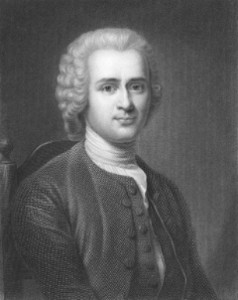May 2012
 Human Progress: The Philosopher’s View
Human Progress: The Philosopher’s View
Dear Reader:
This month I pose the question: Is it possible for society to continue to improve limitlessly? One day, will we achieve a “perfect” society? Or, is it inevitable that populations will ultimately be curtailed by famine, disease or disaster?
My investigation reveals that philosophers have greatly differed in their attempts to answer this question:
18th Century Philosopher,Jean-Jacques Rousseau
1.In the 1200’s, Thomas Aquinas suggested that, everything in the universe strives to achieve its perfection and become more fully what it truly is. Non-rational creatures strive automatically and spontaneously, while creatures with reason and will (humans) must achieve perfection through conscious acts of choice. 1
2. In 18th-century Europe the popular opinion maintained that society could and would continue improving until ultimately “perfection” would be achieved. The philosophies of Godwin, Condorcet, and Rousseau all support the theory of endless
progress towards a utopian society.
3. English scholar, Thomas Robert Malthus, became widely known for his theories that opposed this idea. In Malthus’s “An Essay on the Principle of Population,” he writes: “The power of population is indefinitely greater than the power in the earth to produce subsistence for man”. Malthus believed that population would inevitably grow and, as it grew, would be met by limited means of substance. – Melissa Leonard
THE ATTAINMENT OF “MORE” AND “ENOUGH”
My first day of philosophy class, the professor made a big deal about what we, as human beings,
want. He asked us, “What does Lex Luthor, the arch enemy of Superman, want?”
After much debate we came to the conclusion that Lex Luthor simply wants “MORE”. It does not matter how much he
has, he wants MORE. This human character trait was what my professor was trying to illustrate. Perhaps if this were not the case, we would all still be living as hunters and nomads on the plains of Africa.
So, how is this relevant to Melissa’s question? At Work for All, we want everyone to have opportunities so
that, if they are willing and able to work, they can attain “enough”.
We expect that each person will define “enough” for themselves and their families. We believe that it is in the best interest of all people to have functional economies, consisting of producers and consumers, in all corners of the globe. The largest possible market – all of us – can be best reached by ensuring that those who are striving for MORE will first aim for everyone to have ENOUGH.
Human beings will continue to improve their lot. Though improvements come in stops and starts. We will not run out of food because we do not need to rely on existing food sources alone. We can and do innovate.
At Work for All, we do not want to mandate each individual’s definition of “Enough”. What we do want is to enable societies so that everyone within that society has the opportunity to work towards their “enough” if they choose to do so. We may not achieve the philosopher’s utopia, but we can make strides towards “enough” for all. – Jeremy Leonard
1 Copyright 2012 The Witherspoon Institute
